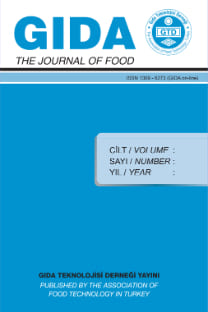Peyniraltı Suyundan Yoğurt Eldesi
Peynir üretiminde organik yükü yüksek olan ve peyniraltı suyu adı verilen yeşilimsi-sarı renkte bir atık ortaya çıkmaktadır. Türkiye’de yılda yaklaşık olarak 7.784.000 ton peyniraltı suyu üretilmektedir. Bu çalışmanın amacı peyniraltı suyuna yağsız süt tozu katarak Türk mutfağında yüksek gıda değeri nedeniyle yaygın bir yere sahip olan yoğurt elde etmektir. Yoğurt eldesi sırasında Lactobacillus bulgaricus ve Streptococcus thermophilus kültürleri kullanılmıştır. Çalışmada kullanılan asidik peyniraltı suyu Topçuoğlu fabrikasından temin edilmiştir. Tatlı peyniraltı suyu ise laboratuvarda pastörize sütten üretilmiştir. Hem yağsız süttozu hem de aşı %6 oranlarında peyniraltı sularına katılmıştır. İnkübasyon 44 oC’de bir saat devam etmiştir. Topçuoğlu peyniraltı suyundan üretilen yoğurdun süt yağı %0.03, yağsız katı madde miktarı %9.844 ve titre edilebilir asitlik değeri %0.0286’dır. Laboratuvarda üretilen peyniraltı suyundan yapılan yoğurtta ise bu değerler sırasıyla %0.4, %12.123 ve %0.0239’dur. Her iki tip yoğurdun peroksidaz testlerinin negatif, Koliform ve E. coli bakterilerinin olmadığı, küf ve maya sayımının yüzden fazla olduğu tespit edilmiştir.
Yoghurt Production from Cheese Whey (Turkish with English Abstract)
Cheese manufacturing generates a strong waste known as whey. Whey is a greenish-yellow clear solution which is produced as a by-product. Annual whey production of Turkey is the range of 1.784.000 tons. The objective of this study was to produce yoghurt from cheese whey by adding non-fat dried milk. Yoghurt is a common ingredient of Turkish diet because of its high nutritional value. The acidic whey sample was obtained from Topçuoğlu Dairy Plant. The sweet whey sample was produced in the laboratory from pasteurized milk. The microbial cultures used to produce yoghurt were Lactobacillus bulgaricus and Streptococcus thermophilus. Both non-fat dried milk and inoculum were added at the rate of 6% into the pasteurized whey. Incubation was 44 oC for one hour. According to the analyses, yoghurt from the Topçuoğlu whey was contained 0.03% milk fat, 9.844% non-fat solid and titratable acidity was 0.0286%. Yoghurt from the laboratory whey contained 0.4% milk fat, 12.123% non-fat solid, and titratable acidity was 0.0239. The yoghurt analyses showed that peroxidase test was negative, Coliform bacteria and E. coli were not detected. The amount of mold and yeast was less than 100.
